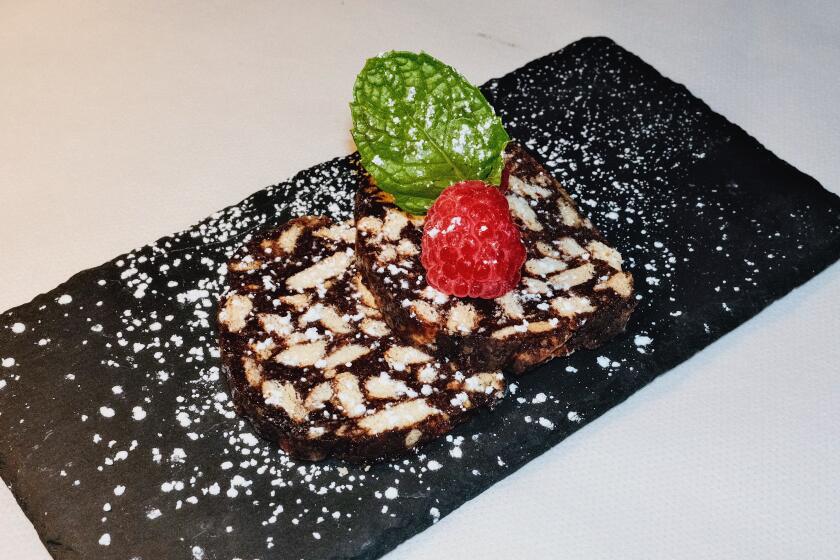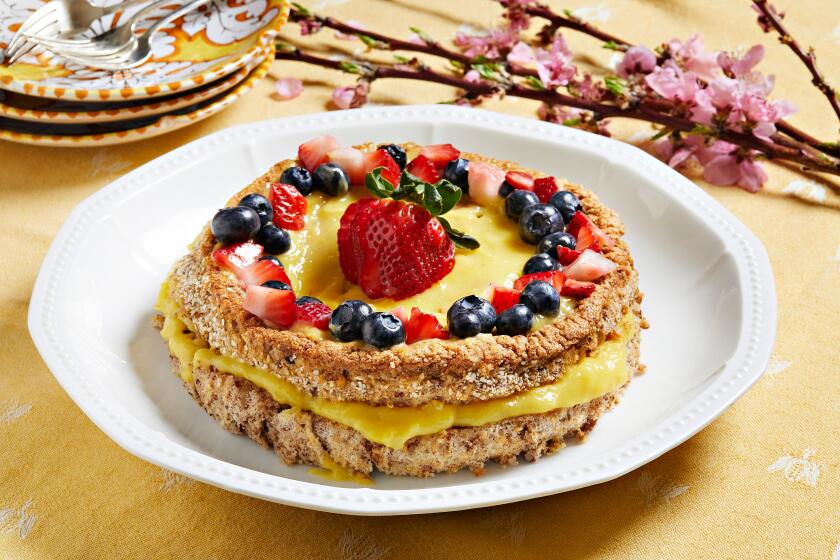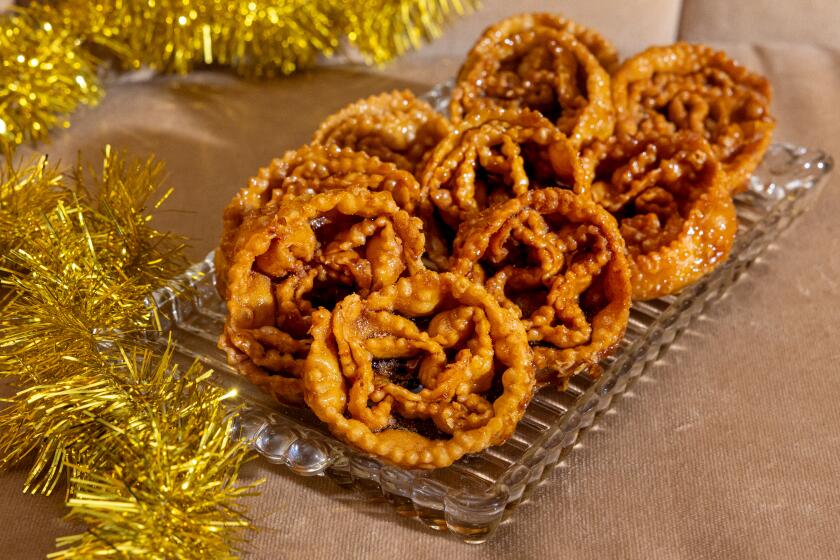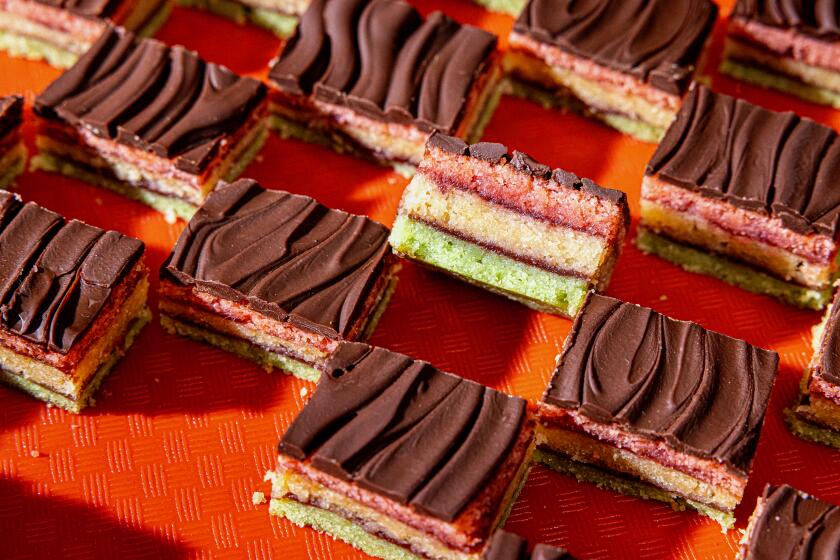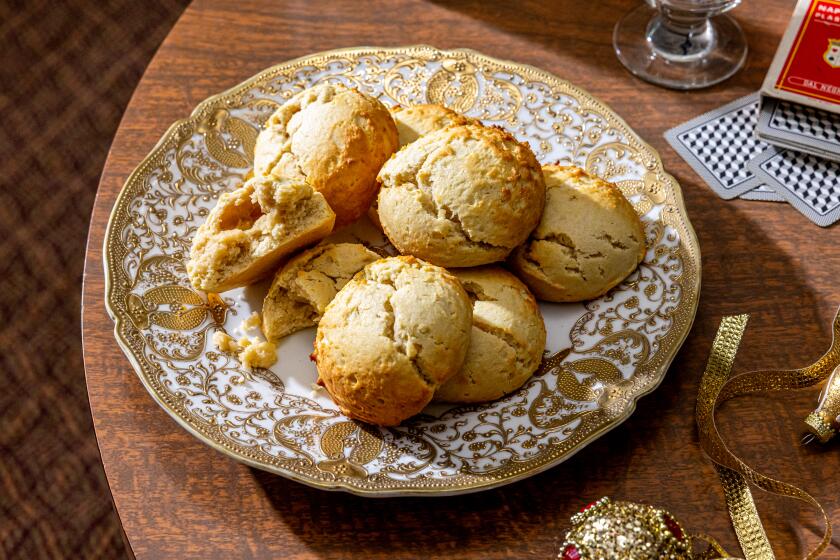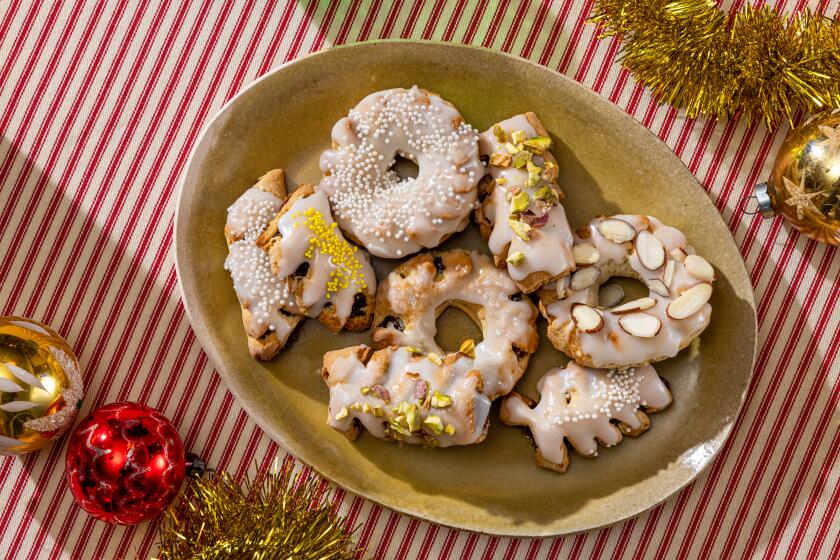Millionaire's shortbread
- Share via
I don’t know what I was thinking. I promised my 13-year-old daughter that a big part of our trip to Scotland would be visiting tearooms and sampling the baked goods. Then, I said, we’d get the recipes for our favorite scones or oatcakes or whatever and we’d come home and bake them ourselves.
They speak English over there; we speak English. We’d get the recipes on the spot, or get an e-mail address for later. It’d be educational, I thought.
It was far more educational than I ever planned it to be.
The driving through Scotland and stopping for tea part worked out well. The Scots pride themselves on being the best home bakers in Europe, they say, and many tearooms and coffeehouses serve home-baked desserts, tea cakes and breakfast pastries. In some cases, they buy from local home-based cooks; in others, staff bakers bring their recipes from home and up the quantities a bit.
Irene and I were careful to ask which items were traditionally English and which traditionally Scottish. We discovered that we loved the hearty oatmeal/ginger/molasses/dried fruit flavors of Celtic baking.
Among our favorites were the many oatmeal-based goodies Americans would loosely categorize as cookies: “oaties,” “biscuits” and “tray bakes” (layers of oats or shortbread topped with fruit mixtures or toffee), as well as “parkins” (cake-like bar cookies), “perkins” (drop cookies) and “flapjacks” (flourless oatmeal bars). Shortbread in many variations was offered everywhere, and there were scones and more scones, sweet and savory.
Trying to duplicate these delectables at home turned out to be tricky, at first. I brought home a few cookbooks as well as recipes graciously given from tearooms. But I hadn’t brought home any raw ingredients, so when I actually read the recipes and saw that they called for unfamiliar (to me) ingredients like golden syrup, sultanas (raisins), porridge oats (rolled oats), caster sugar (granulated sugar), muscovado sugar and demerara sugar (types of brown sugars), I had to call some British expatriate neighbors for translations.
I did know the Scots used all sorts of oatmeals, so I thought I’d just use trial and error to figure out which was which. I went to Trader Joe’s and got some fancy imported kinds to supplement a giant box of Quaker rolled.
In the back of my mind I had also known that U.K. measurements were not the same as ours, but how big a problem could that be? I blithely tackled one batch of scones and another of some simple, three-ingredient flapjacks.
Disaster. The scones were tough and salty. The flapjacks were runny and soggy. The next batch were like rocks. The next were smooshy and wouldn’t set, and the fancy oatmeal still tasted uncooked.
Irene lost interest after a few days of infrequently edible results. But my other daughter, Patricia, a freshman at UCLA, bought me a food scale and tried to help my math-impaired brain grasp the techniques for estimating and converting liquid and dry grams and ounces to cups.
I began to send plaintive e-mails to the bakers I’d talked to on my trip, and they kindly responded. I found a handy conversion table that enabled me to estimate that there are about 4 ounces of flour, 6 ounces of raisins and 8 ounces of butter to a cup.
Some of my Scottish baking recipes have yet to yield their secrets, but a half-dozen have turned out to be so much fun to make and serve that they’ve entered the family repertoire.
I am now a confident scone maker, thanks to an easy and very forgiving recipe from John Steven McLaren at Trossochs Woolen Mill in Kilmahog by Callander, Perthshire.
Two other very traditional Scottish baked goods are now staples in our home. Bannock (“hill” or “dome” in Scottish) is a yeasted fruit bread that originated 100 years ago at a bakery in Edinburgh. Many different kinds of breads named “bannock” can now be found through Britain and Canada, but the loaf I made from a recipe from Clive Ramsay, a fine food retailer in the town of Bridge on Allan, sounds quite like descriptions of the original.
Oatcakes--simple crackerlike rounds of oats, fat and flavorings--were once daily fare in Scotland. Some folks never gave up eating them, but they fell from favor as bland commercial versions replaced fresh homemade batches. Oatcakes turned out to be quite easy to make, and though kids rarely love them, adults like the not-so-sweet taste and crunchy texture, and feel almost virtuous eating them.
Two other desserts I adopted from Scotland, however, cut straight to the sinful chase. A truly unusual and tasty oatmeal meringue cake developed by cookery school director Mo Scott is based on egg whites and oatmeal, but to counteract any low-fat effects, it’s spread with whipped cream before serving.
Another indulgent treat is Millionaire’s Shortbread, versions of which are found everywhere in Scotland. The theory behind this cookie is something along the lines of if you’re going to do it, you might as well overdo it. It’s an amusing case of overkill, with the already too-rich butter-and-sugar shortbread base topped with caramel, another Scots’ flavor favorite.
If a country’s cuisine mirrors its soul, then Scotland’s baked goods hint at some underpublicized aspects of the national psyche. Scones and oatcakes meet our expectations of thrift and practicality--but Millionaire’s Shortbread tells us that there’s another side to the story.
Base
Cream butter gently in electric mixer using dough hook until light, 3 to 4 minutes. Add powdered sugar and continue beating a few more minutes. Slowly add flour and cornmeal and continue to mix with dough hook until dry ingredients are incorporated, 4 to 5 minutes. Dough will be dry.
Press dough into 13x9-inch baking pan, and pierce repeatedly across bottom with fork to prevent it from rising. (If making plain shortbread, mark dividing lines between cookies same way).
Bake at 275 degrees 1 hour. Turn oven off and open door to allow some heat to escape. Leave shortbread in oven to continue to dry out another 30 minutes. Remove from oven and cool but do not remove from pan.
Topping
Heat milk, margarine, sugar and syrup in saucepan over medium heat, stirring often, until mixture begins to come away from sides of pan, 8 to 10 minutes. Pour over cooked shortbread (still in its pan) and cool.
Melt chocolate chips in double boiler set over, but not touching, simmering water, or in microwave, and spread in layer over set caramel. Cool. Cut into fingers or squares.
Get our Cooking newsletter.
Your roundup of inspiring recipes and kitchen tricks.
You may occasionally receive promotional content from the Los Angeles Times.










